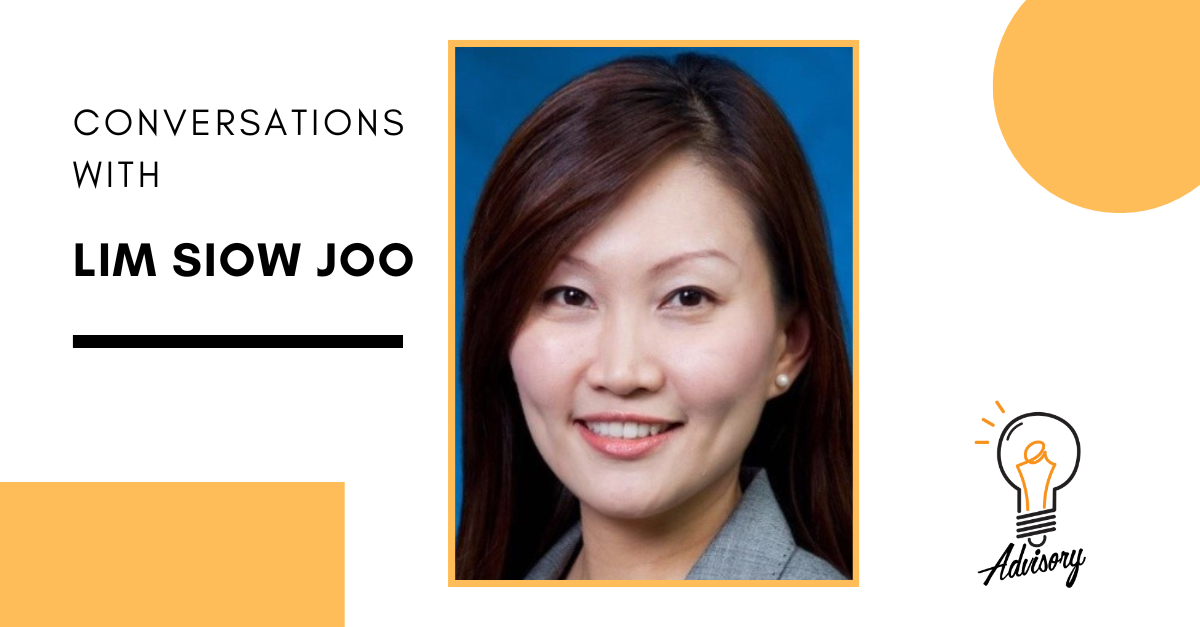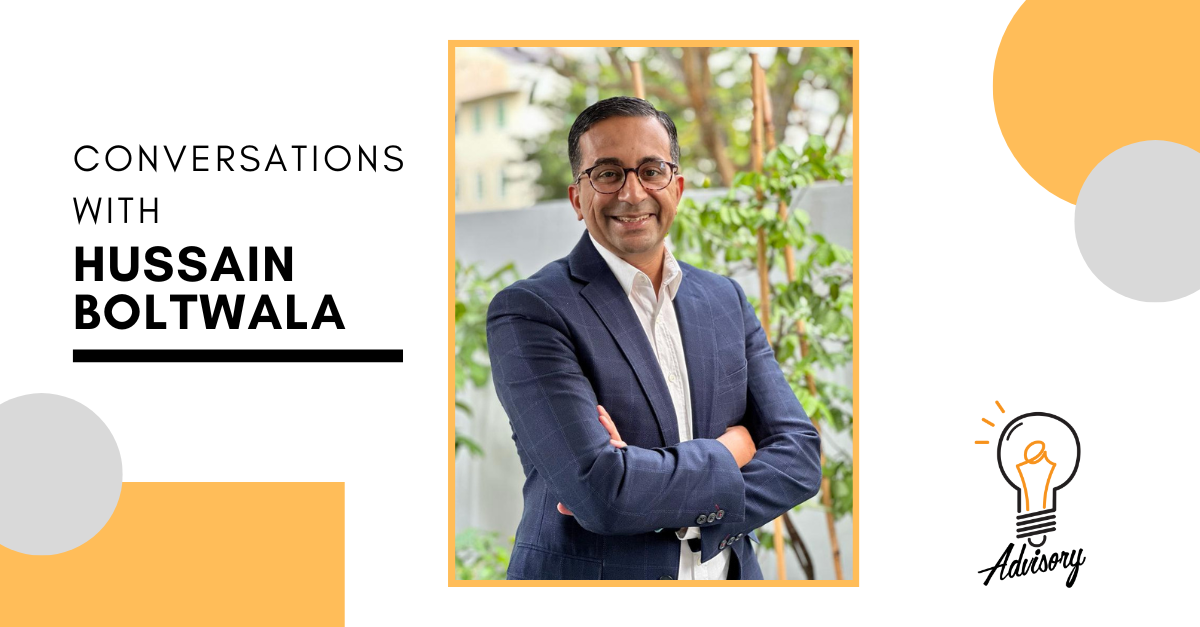Conversations with Lim Siow Joo

By Caleb Thien
Siow Joo, a seasoned communications professional, builds and manages the corporate reputation of companies. In this capacity, she collaborates with top teams to bring value to the companies they operate. In this article, Siow Joo reflects on the diverse roles undertaken in her communications career.
Let’s start by introducing yourself, your current position and your educational background.
I am Siow Joo, and I am currently with Royal Golden Eagle (RGE) Pte Ltd as Deputy Head of its Group Corporate Communications department. I have been in public relations (PR) and corporate communications for the past two decades. When I was at Nanyang Technological University (NTU), I was part of the third batch in the new communications major. In my third year, I specialised in PR and advertising.
What does your work entail?
My work entails a wide spectrum of functions, as diverse as issue management, crisis management, publicity, stakeholder management, PR, internal and external corporate communications, and customer management.
I began my career with a large PR agency - Hill & Knowlton. Back then, it was standard practice for students to apply to big PR agencies to gain exposure to essential PR skills. Other large PR companies at that time included Weber Shandwick and Burson-Marsteller.
After my stint at Hill & Knowlton, I joined a smaller boutique PR firm Grayling Public Relations and two years later, I joined the newly established Temasek’s corporate communications department. As Temasek’s investments are global in nature, my scope of work and working hours span multiple geographies and were very dynamic and high pressure. However, they also provided valuable learning opportunities. I have learnt to manage and plan for uncertainties and gained a consciousness for thinking ahead to mitigate risks. I was also given the opportunity to meet a wide variety of people across all levels and in various markets.
After Temasek, I joined Standard Chartered, where I was exposed to regulatory and compliance affairs. I was again given the privilege of working with great teams and due to my previous experience at Temasek, I was also very much responsible for its issues management. It was another interesting learning journey for me. At Standard Chartered, my role grew from a Singapore role to a regional one. I was in charge of their external communications for 15 markets so I had to deal with various issues across these markets. I also covered the proactive media strategy for all customer segments ranging from retail banking to institutional banking. The spread across segments meant I had to customise our messages and communications materials for different groups of customers who relate to different things.
After eight years with Standard Chartered, I took a short break before joining SP Group where I led the media and customer engagement team. Most of the time, communications teams do not deal directly with customers. At SP Group, I had to do so, by formulating responses for the call centre, developing SOPs for customer queries and even speaking directly with customers to help address their concerns. It was a humbling experience as it brought me from high-level thought leadership, to real concerns on the ground. This, to me, is more valuable than getting the CEO an interview.
Looking back, the most stressful period of my work life might have been at Temasek, where work was more issue-driven as I was frequently sent to speak on the ground with key stakeholders. However, with increasing seniority, I get to manage teams now and my focus has shifted from what I should do, to what I should do for my team to help them grow. This involves team building and career planning for the team.
What are some crucial skills in the corporate communications function that are not necessarily taught in university?
The most important skill in any organisation is the ability to connect the dots. Most of the time, we are dealing with limited information. So we need to be able to read the room and connect the dots that are not in front of you. This skill is key in aligning different agendas and interests, so that everyone feels that he/she has won.
I also believe in having a can-do attitude. In my career, I have pursued new roles and taken on new responsibilities. The organisations that I worked with were also at a crucial point of their transformation. During these turning points, the organisations will benefit from its people thinking out of the box. I believe that we should always try, even if it has not been done before. It is okay to fail but fail fast and move forward. Inaction is the worst plan. Doing the same things and expecting different results would not work.
Finally, scenario planning is also crucial. In issues management, we always plan for various scenarios and prepare the communications for each scenario. Even if we do not get to use the materials in the end, the idea is to have them in your back pocket so that if it does happen, you can launch them immediately. As I have been mainly in charge of issues management, this has become a habit – to plan ahead and be equipped with plans. Scenario planning helps to achieve two objectives: 1) timeliness of your communications because you have it already, and 2) you have control over the game plan and your own time.
Must a communications professional have a communications degree?
That is not necessarily the case. I have had interns and colleagues who were from other disciplines, eg. English major, engineering, business, economics – quite a wide spectrum.
To me, a communications professional needs to be able to write proficiently, break down complicated things to simple ideas and communicate these ideas to your audience in the way that your audience would like to hear it.
As you become more senior as a communications professional, how do you see communication needs and approaches change?
Change is constant. Fluidity is the norm.
When I was younger, I tended to look at things in a simplistic manner, which led to me seeing things in either black or white. Soon, I found out that there are so many shades of colours and even techno-coloured rainbows!
With external events such as Covid, the Russia-Ukraine war, multiple elections taking place this year, we have to keep up with changes and learn to navigate the developments and their impacts not just on us, but also on the world. Communications would have to be a lot more dynamic so it is important not to have a fixed mindset. Be open.
Between industries, are there distinct differences in communication styles?
Yes, the most apparent difference is the communications style between businesses (B2B) & between businesses and consumers (B2C). Communications for B2Bs are more corporate in tone, whereas communications for B2Cs can be more casual and cater more to customers.
What is your approach to crisis communication?
Stay calm and plan ahead. Conduct regular simulation exercises with the bigger teams. We would have simulation exercises to rehearse disaster response. Crisis communication strategies have to be planned in advance to ensure timely communication with key stakeholders. Crisis communication strategies have to be planned in advance to ensure timely communication with key stakeholders.
My key principles to crisis communication are related to people, timing and information – place people first, reassure quickly, and state the facts.
Being in this industry for some time and having experienced its inner workings, what is something that is difficult to understand from an outsider's perspective?
People who are not in communications may not realise the extent of work involved and the strategic level required to position the company, mitigate potential issues and build the company’s brand and reputation.
For organisations that value the role of communications, the communications head tends to get a seat at the management level and be involved in management meetings. Being involved and informed about the company’s latest happenings helps the communications department to better support the business.
Over the past 10 - 20 years, how have you seen the industry change?
10 - 15 years ago, the communications function largely revolved around increasing general publicity for our clients by getting the word out to as many people as possible. Our key performance indicator used to be a quota to produce a set number of publicity materials.
Today, communications have to be targeted and this does not merely mean reaching out to as wide an audience as possible, but also to the right audience. There is also increasing public scrutiny on businesses and companies. The social licence to operate has to be earned now. So leveraging communications to establish trust is of the essence. Instead of fancy words, genuine words matter more. Authenticity is now key.
If you could advise prospective graduates thinking of entering the field of communications, how should one position or prepare himself?
It is true that students from certain degree studies may find it easier to transition into communications, such as business or the humanities. However, everyone can find opportunities to display the following three qualities:
- Writing and communication skills
- A can-do attitude
- Relatability to different target audiences
What do you find the most rewarding about working in corporate communications?
Looking back, I tended to join organisations at the pivotal moment when they were in the midst of transformation. Be it joining a new team, or establishing a new way of communication, it has been rewarding to play a key role in the organisation’s evolution and growth.
As a corporate communications professional, what is something that is always on your mind?
Anticipating PR issues that may come with business decisions, and executing preventative scenario planning to prevent an issue from becoming a crisis.
What is something that you deliberately do on a day-to-day basis?
I enter the office at 7:30am and leave promptly at 5pm. While I may continue with my work at home, I believe that one should not spend long hours at the office. If I do, it means I am not very efficient and will find ways to ensure that I increase my productivity.
Before we close this interview, is there anything else that you would like to share with our readers?
Put pride and passion into whatever you do, and you will find yourself doing well while enjoying the scenery along the way!



